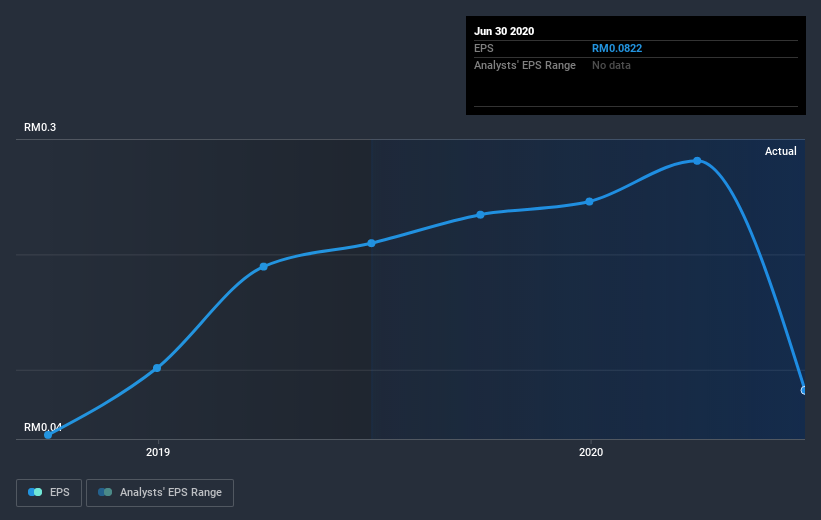Keck Seng (Malaysia) Berhad's (KLSE:KSENG) Shareholders Are Down 29% On Their Shares

In order to justify the effort of selecting individual stocks, it's worth striving to beat the returns from a market index fund. But even the best stock picker will only win with some selections. So we wouldn't blame long term Keck Seng (Malaysia) Berhad (KLSE:KSENG) shareholders for doubting their decision to hold, with the stock down 29% over a half decade. The good news is that the stock is up 1.4% in the last week.
Check out our latest analysis for Keck Seng (Malaysia) Berhad
To paraphrase Benjamin Graham: Over the short term the market is a voting machine, but over the long term it's a weighing machine. By comparing earnings per share (EPS) and share price changes over time, we can get a feel for how investor attitudes to a company have morphed over time.
Looking back five years, both Keck Seng (Malaysia) Berhad's share price and EPS declined; the latter at a rate of 29% per year. The share price decline of 7% per year isn't as bad as the EPS decline. So the market may previously have expected a drop, or else it expects the situation will improve.
You can see below how EPS has changed over time (discover the exact values by clicking on the image).

It might be well worthwhile taking a look at our free report on Keck Seng (Malaysia) Berhad's earnings, revenue and cash flow.
What about the Total Shareholder Return (TSR)?
Investors should note that there's a difference between Keck Seng (Malaysia) Berhad's total shareholder return (TSR) and its share price change, which we've covered above. The TSR is a return calculation that accounts for the value of cash dividends (assuming that any dividend received was reinvested) and the calculated value of any discounted capital raisings and spin-offs. Dividends have been really beneficial for Keck Seng (Malaysia) Berhad shareholders, and that cash payout explains why its total shareholder loss of 22%, over the last 5 years, isn't as bad as the share price return.
A Different Perspective
Keck Seng (Malaysia) Berhad shareholders are down 20% for the year, but the market itself is up 4.4%. Even the share prices of good stocks drop sometimes, but we want to see improvements in the fundamental metrics of a business, before getting too interested. Unfortunately, last year's performance may indicate unresolved challenges, given that it was worse than the annualised loss of 4% over the last half decade. Generally speaking long term share price weakness can be a bad sign, though contrarian investors might want to research the stock in hope of a turnaround. While it is well worth considering the different impacts that market conditions can have on the share price, there are other factors that are even more important. For instance, we've identified 3 warning signs for Keck Seng (Malaysia) Berhad (1 makes us a bit uncomfortable) that you should be aware of.
If you are like me, then you will not want to miss this free list of growing companies that insiders are buying.
Please note, the market returns quoted in this article reflect the market weighted average returns of stocks that currently trade on MY exchanges.
If you’re looking to trade Keck Seng (Malaysia) Berhad, open an account with the lowest-cost* platform trusted by professionals, Interactive Brokers. Their clients from over 200 countries and territories trade stocks, options, futures, forex, bonds and funds worldwide from a single integrated account. Promoted
Valuation is complex, but we're here to simplify it.
Discover if Keck Seng (Malaysia) Berhad might be undervalued or overvalued with our detailed analysis, featuring fair value estimates, potential risks, dividends, insider trades, and its financial condition.
Access Free AnalysisThis article by Simply Wall St is general in nature. It does not constitute a recommendation to buy or sell any stock, and does not take account of your objectives, or your financial situation. We aim to bring you long-term focused analysis driven by fundamental data. Note that our analysis may not factor in the latest price-sensitive company announcements or qualitative material. Simply Wall St has no position in any stocks mentioned.
*Interactive Brokers Rated Lowest Cost Broker by StockBrokers.com Annual Online Review 2020
Have feedback on this article? Concerned about the content? Get in touch with us directly. Alternatively, email editorial-team@simplywallst.com.
About KLSE:KSENG
Keck Seng (Malaysia) Berhad
Engages in the cultivation and sale of oil palm in Malaysia, Singapore, Hong Kong, Canada, and the United States.
Flawless balance sheet unattractive dividend payer.
Market Insights
Community Narratives




